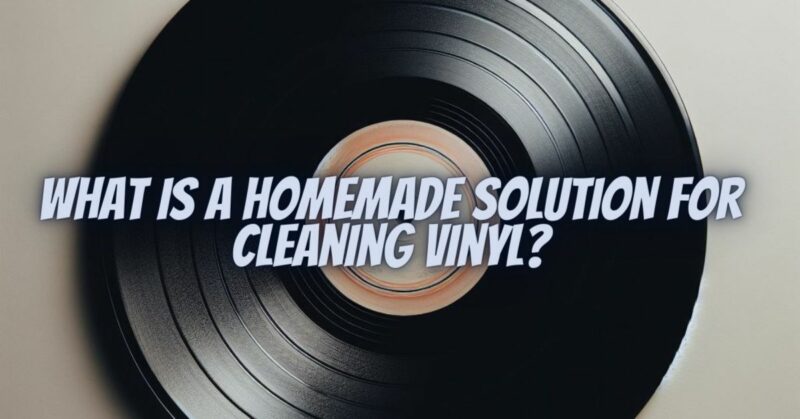Vinyl records have made a remarkable comeback in recent years, attracting both audiophiles and music enthusiasts with their unique, warm sound. To maintain the integrity and longevity of your vinyl collection, regular cleaning is essential. While commercial record cleaning solutions are readily available, many vinyl enthusiasts prefer DIY approaches using homemade solutions. In this comprehensive guide, we will explore the art of crafting homemade vinyl record cleaning solutions, detailing various recipes and best practices to ensure your cherished records remain pristine.
The Importance of Cleaning Vinyl Records
Vinyl records are vulnerable to accumulating dust, dirt, oils, and contaminants, which can degrade sound quality and compromise the overall listening experience. Regular cleaning not only enhances audio fidelity but also extends the lifespan of your records by reducing wear and tear on the stylus and grooves. Clean records produce less surface noise, pops, and clicks, providing a more enjoyable listening experience.
Homemade Vinyl Cleaning Solutions
Crafting your homemade vinyl record cleaning solution can be cost-effective, environmentally friendly, and satisfying. Here are some effective DIY recipes and best practices:
Recipe 1: Distilled Water and Isopropyl Alcohol
This simple solution effectively cleans and removes contaminants from vinyl records. You’ll need the following:
- Distilled water
- Isopropyl alcohol (99% pure)
- A clean, lint-free cloth or microfiber brush
- A spray bottle
Steps:
- Mix a solution of 20% isopropyl alcohol and 80% distilled water in a spray bottle. Ensure the isopropyl alcohol used is 99% pure, as lower concentrations may leave residue.
- Spray the solution lightly onto the record’s surface, avoiding excessive saturation.
- Gently wipe the record’s surface using a lint-free cloth or a microfiber brush. Follow the grooves in a circular motion.
- Rinse the record with distilled water to remove any residue.
- Allow the record to air dry completely before playing.
Recipe 2: Wood Glue Method
The wood glue method, also known as the “wood glue cleaning” method, is a popular DIY approach for deep cleaning dirty or damaged records. You’ll need:
- PVA wood glue (e.g., Elmer’s Glue-All)
- A clean, lint-free cloth or microfiber brush
- A plastic spreader or flat-edge tool
- A plastic tray or sheet of plastic wrap
Steps:
- Apply a thin, even layer of PVA wood glue to the record’s surface. Use a plastic spreader or flat-edge tool to spread the glue evenly across the entire surface, avoiding the label.
- Let the glue dry completely. This typically takes 12-24 hours, depending on humidity levels.
- Once the glue has dried, carefully peel it off the record surface. The glue will lift away contaminants, leaving the record clean.
- Use a lint-free cloth or microfiber brush to remove any remaining residue from the grooves.
- Rinse the record with distilled water to ensure no glue residue remains.
- Allow the record to air dry completely before playback.
Recipe 3: Soap and Distilled Water
For mild cleaning, a solution of soap and distilled water can be effective. You’ll need:
- Distilled water
- A gentle, pH-neutral dish soap (avoid harsh detergents)
- A clean, lint-free cloth or microfiber brush
- A spray bottle
Steps:
- Mix a solution of distilled water and a few drops of gentle, pH-neutral dish soap in a spray bottle. Avoid using abrasive or harsh detergents.
- Spray the solution lightly onto the record’s surface.
- Gently wipe the record’s surface using a lint-free cloth or a microfiber brush, following the grooves in a circular motion.
- Rinse the record with distilled water to remove any soap residue.
- Allow the record to air dry completely before playing.
Best Practices for Homemade Cleaning:
- Always use distilled water, as tap water may contain minerals that can leave residue on records.
- Avoid excessive saturation to prevent water from seeping into the label or record jacket.
- Ensure your hands are clean and free of oils before handling records.
- Store cleaned records in anti-static inner sleeves to minimize static buildup and dust attraction.
- Regularly clean your cleaning tools, such as brushes and cloths, to prevent cross-contamination.
Cleaning your vinyl records is an essential aspect of vinyl ownership, ensuring that your cherished music collection remains in excellent condition for years to come. Homemade cleaning solutions provide a cost-effective and DIY-friendly approach to record maintenance. Whether you choose the distilled water and isopropyl alcohol method, the wood glue method, or the soap and distilled water solution, following proper cleaning techniques and handling practices is essential to preserve your records’ audio quality and longevity. By investing time and care in the cleaning process, you can continue to enjoy the rich, analog sound that makes vinyl records a timeless and cherished medium for music playback.


